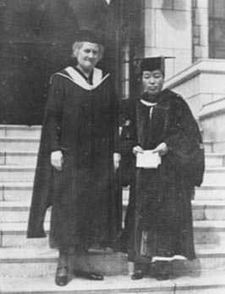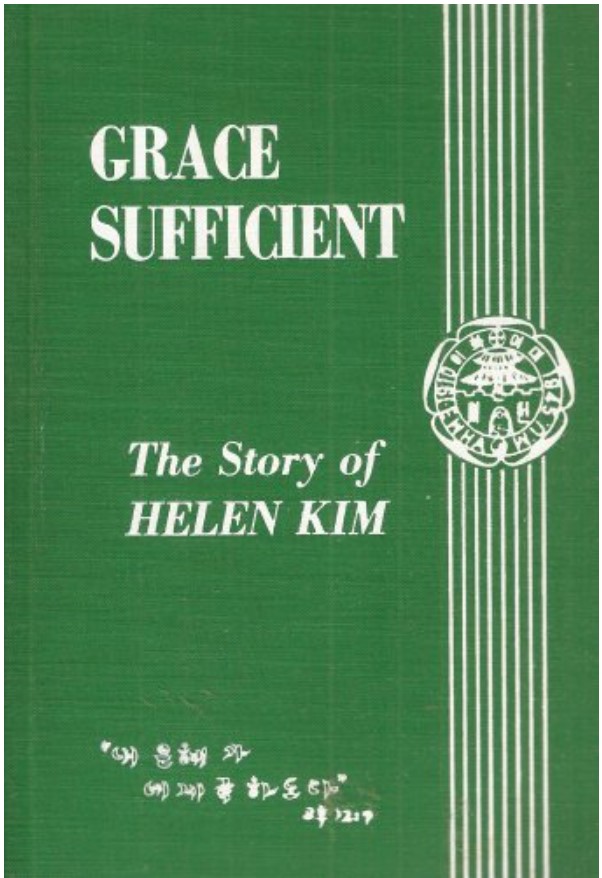From Morningside Heights to the Land of the Morning Calm
When a decision is made to do all that you can for others, what flows from it can exceed expectations. The largest women’s university in the world, which sprang from soil that held no precedent for it, is a case in point.
Alice Rebecca Appenzeller with a graduate
(1885-1950)
Today, Ewha is the world’s largest women’s college.
When a decision is made to do all that you can for others, what flows from it can exceed expectations. The largest women’s university in the world, which sprang from soil that held no precedent for it is a case in point.
Through the 140+ years since its founding in 1887, Columbia University’s Teachers College has nurtured the vision and passions of nearly 100,000 educators from around the world. Among them were two courageous graduates who pioneered women’s education in Korea.
Alice Rebecca Appenzeller (1885-1950) entered the world as Korea’s first American missionary baby. Her parents, Mr. and Mrs. Henry Appenzeller, the country’s first American Methodist missionaries, reached Korea’s shores on Easter Sunday, 1885, after a four-month voyage. Seven months later, Alice was born in Seoul. The following year, Henry Appenzeller and three Korean male students opened a bilingual secondary school, Pa-Jae, “The school to nurture talent.” Pa-Jae has become one of Korea’s most prestigious schools. Henry was also the prime translator of the New Testament into Korean. Sadly, his life was cut short at the age of 44. En route to a Bible translators’ conference, he drowned trying to rescue his Korean assistant and a Korean child.
Alice, losing her father as a teenager, inherited his love for Korea and his vision for Christian education. After graduating from Wellesley College, she returned to teach Korean girls, devoting her life to women’s education, at a time when the concept scarcely existed in Confucian Korea. Bound to filial and marital duties, women were denied the opportunity to learn. At Ewha, “the pear blossom school” for girls established by another missionary couple, Alice began in 1915 as a kindergarten teacher. After earning her degree at Teachers College in 1922, she became the sixth president of Ewha Women’s College. Under her guidance, Ewha greatly expanded its physical, intellectual, and spiritual capacity to raise educated, godly, Korean women. Today, Ewha is the world’s largest women’s college.

Under [Alice’s] guidance, Ewha greatly expanded its physical, intellectual, and spiritual capacity to raise educated, godly, Korean women. Today, Ewha is the world’s largest women’s college.
Alice’s leading role at the school ceased abruptly with her exile by the occupying Japanese government in 1940. Ewha then came under the direction of a second Teachers College graduate, Whallan Kim (1899-1970), TC 1930. Whallan’s family had become acquainted with God through her mother’s faith in Jesus. Prizing education, she enrolled her sisters and Whallan at Ewha, where Alice eventually became her mentor. Her mother’s unceasing prayers came to fruition when sixteen-year-old Whallan dedicated her life to God.
In her autobiography, Grace Sufficient, she writes that she had difficulty accepting that she was a sinner. One day, she felt deeply challenged by a sermon about sin and humanity’s need for redemption. She described her encounter with Jesus as follows: “…Suddenly the illumination came to me that my sins were pride, self-will, and hatred for the Japanese. I fell upon the floor and asked God to forgive my sins. I immediately felt his forgiveness.
“[Then] I seemed to see him take the three bags of my sins away, showing me what the rest of my life was to be about. He pointed out to me a big dug-out moat where a mass of Korean women were crying out for help with their hands outstretched from the haze and confusion….”

“…Suddenly the illumination came to me that my sins were pride, self-will, and hatred for the Japanese. I fell upon the floor and asked God to forgive my sins. I immediately felt his forgiveness. [Then] I seemed to see him take the three bags of my sins away, showing me what the rest of my life was to be about. He pointed out to me a big dug-out moat where a mass of Korean women were crying out for help with their hands outstretched from the haze and confusion….”
— Whallan Kim, in her autobiography Grace Sufficient
Whallan Kim displayed the excellence of God’s love and integrity in her life. When the Japanese Government cut off missionary support to Ewha, she ceased to draw her salary. Instead, she sold her home and property to sustain the salaries of her fellow educators, showing love and patience to the Japanese government that so closely scrutinized her every move.
Whallan’s relationship with Alice Appenzeller continued through the years of Alice’s exile. After World War II ended, Alice returned to her beloved Korea. She died in 1950 at Ewha, while leading a chapel service. Whallan went on to serve in the South Korean President’s Cabinet, and died in 1970 at the age of 71.
Yangsoon Cho, Columbia Arch ’02
